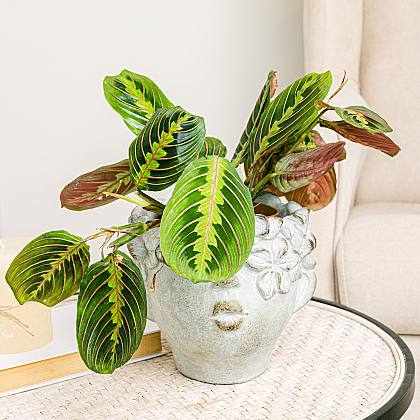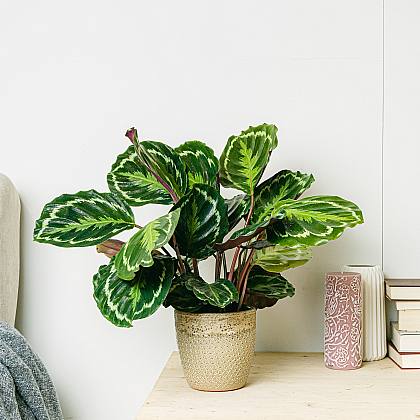Caution poisonous: taboo houseplants for cats
Beware of poisonous: Taboo houseplants for cats - Cats are curious animals that like to explore their surroundings. However, some houseplants can be dangerous for them
Beware of poisonous: Taboo houseplants for cats - Cats are curious animals that like to explore their surroundings. However, some houseplants can be dangerous for them. In this article, you'll learn why it's important to keep poisonous houseplants away from cats and which plants are particularly poisonous. You'll also get practical tips on how to prevent poisoning and alternatives to poisonous houseplants so you can create a green and safe home for your cat. You'll also learn how to recognize symptoms of poisoning in cats and what first aid measures to take in an emergency. A veterinarian will also give valuable advice on how to prevent poisoning from houseplants and introduce the best cat-safe houseplants.
Why is it important to keep poisonous houseplants away from cats?
It is important to keep poisonous houseplants away from cats, as they can pose a serious danger to our beloved pets. Cats are naturally curious and love to explore their surroundings, including the interior of our home. However, many houseplants contain toxic substances that can cause poisoning in cats. These poisonings can lead to a variety of symptoms, such as vomiting, diarrhea, difficulty breathing, and even death. By keeping poisonous houseplants away from cats, we protect them from potential health risks.
It's important to note that not all houseplants are toxic to cats. However, there are a number of common houseplants that can be dangerous for cats. These include plants such as the Dieffenbachia, the rubber tree and the poinsettia. These plants contain toxic substances that can cause severe poisoning in cats.
To ensure a safe home for our cats, we should opt for alternative houseplants that are non-toxic to cats. There are many beautiful plant options such as the green lily, the spider plant and the money tree that will brighten up the home while being safe for our furry friends.
Overall, it is of great importance to keep poisonous houseplants away from cats to ensure their health and safety. By consciously choosing non-toxic alternatives and recognizing possible symptoms of poisoning, we can help ensure that our cats can enjoy a green and safe home.
The most common poisonous houseplants for cats
Some houseplants can be toxic to cats and should be avoided to prevent poisoning. The most common poisonous houseplants for cats include the amaryllis, the azalea, the rubber tree, the dieffenbachia, the dragon tree, and the philodendron. Amaryllis contains lycorine, a toxic substance that can cause vomiting, diarrhea, and abdominal pain in cats. The azalea also contains toxic alkaloids that can cause vomiting and diarrhea. The rubber tree can cause skin irritation and stomach problems in cats, while dieffenbachia can cause severe pain and swelling in the throat area when it comes into contact with the cat's mouth. The dragon tree and philodendron contain calcium oxalate crystals, which can cause irritation and swelling when in contact with the mouth. It is important to keep these plants away from cats or replace them with non-toxic alternatives. Examples of safe houseplants for cats include the bamboo palm, the green lily, the violet, and the bromeliad. If you suspect poisoning in your cat, you should act quickly and see the veterinarian immediately. The symptoms of poisoning may include vomiting, diarrhea, loss of appetite or changes in behavior. In any case, you should avoid giving your cat medication or home remedies, as this could make the situation worse. Prompt diagnosis and treatment by a veterinarian is the best way to prevent serious consequences of houseplant poisoning.
Alternatives to poisonous houseplants for a safe home
There are numerous alternatives to poisonous houseplants that ensure a safe home for cats. One option is to switch to plants that are non-toxic to cats. There are a variety of plants that are both beautiful to look at and safe for cats. For example, green lilies, money trees, and bromeliads are popular alternatives. Not only do these plants bring color and freshness to the home, but they also pose no risk to the cat's health.
Another option is to switch to artificial plants. Nowadays, these often look deceptively real and offer the advantage that they do not contain any toxins. This allows you to decorate your home with green accents without worrying about your cat's safety.
In addition, special cat grasses can be a good alternative. These grasses are specially designed for cats and serve as a natural substitute for poisonous plants. Not only are they non-toxic, but they also promote the cat's digestion.
It's important to note that while some plants are considered non-toxic, they can still cause allergic reactions in cats. Therefore, it is advisable to always do some research or seek advice from the veterinarian before buying new plants.
By avoiding poisonous houseplants and instead relying on safe alternatives, you can create a green and cat-safe home at the same time. In this way, you can ensure both the well-being of the cat and your own enjoyment of houseplants.
How to recognize symptoms of poisoning in cats?
Cats are curious animals and love to explore their surroundings. Unfortunately, they can also eat poisonous houseplants, which can lead to poisoning. It is important to recognize symptoms of poisoning in cats in order to be able to act quickly. The signs of poisoning can vary depending on the plant, but some common symptoms include vomiting, diarrhea, loss of appetite, and lethargy. If your cat has eaten a poisonous plant, you may also notice behavioral changes such as aggression or disorientation. Other signs may include difficulty breathing, cramping, and tremors. If you notice one or more of these symptoms in your cat, you should see a veterinarian immediately. Prompt treatment can be life-saving. It's also important to note that some plants don't cause immediate symptoms, but may only appear after a few hours or even days. Therefore, you should always keep an eye on your cat and act immediately if poisoning is suspected.
First aid measures in case of possible poisoning
In the event of possible poisoning, it is important to act quickly and initiate first aid measures to protect your cat's life. The first thing you should do is stay calm and try to identify the substance that your cat has come into contact with. Contact your veterinarian or veterinary clinic immediately for advice and further instructions. Avoid giving your cat anything to drink or eat unless your veterinarian specifically advises you to do so. If the substance sticks to your cat's skin, rinse it gently with lukewarm water, without wetting the face or head. If your cat has swallowed the substance and hasn't vomited yet, your veterinarian may recommend giving her a small amount of activated charcoal to bind the toxins. Keep calm and watch your cat closely for signs of difficulty breathing, cramping, or other unusual symptoms. It's important to have all the information about the potential poisoning ready, including the name of the plant or substance, as well as the amount your cat may have ingested. By responding quickly and correctly and taking immediate first aid measures, you can reduce the risk of severe poisoning and ensure your cat's well-being.
Veterinarian Tips to Prevent Poisoning from Houseplants
Veterinarians provide important tips on how to prevent poisoning from houseplants to ensure the safety of cats. It is recommended to keep poisonous plant species out of the house and instead resort to non-toxic alternatives. To ensure that no dangerous plants are accessible near cats, owners should regularly check their homes for potentially poisonous houseplants and remove them if necessary. In addition, it is important to place the plants out of the reach of the cats, for example on raised shelves or in hanging pots. Another preventative measure is to provide the cats with enough other opportunities to chew and play to reduce their interest in the plants. It may also be helpful to treat the plants with a bitter flavor protectant to reduce the attractiveness to the cat. In case of poisoning, the veterinarian should be contacted immediately. It is advisable to have all the information about the possible poisonous plant ready to allow for faster diagnosis and treatment. In some cases, it may be necessary to perform first aid measures such as rinsing the mouth or removing toxic residue before contacting the veterinarian. By following these tips, owners can help ensure that their cats are safe from poisoning from houseplants while creating a green and pleasant home.
The Best Cat-Resistant Houseplants for a Green and Safe Home
If you have a cat, you want to make sure your houseplants aren't toxic to them. But that doesn't mean you have to give up a green home. There are many cat-safe houseplants that you can place in your home.
One of the best options are green plants such as the spider plant or the green lily. These plants are easy to care for and don't require a lot of sunlight, making them ideal for indoor use. Plus, they're non-toxic to cats and can even help improve the air quality in your home.
Another option is the Calathea plant, also known as the "zebra plant". This plant has beautiful leaves with unique patterns and colors and is also safe for cats. It prefers humid conditions and thrives best in a room with high humidity.
If you are looking for a flowering plant that is safe for cats, then the African violet is a great choice. This plant produces beautiful flowers of different colors and requires little sunlight.
Other cat-safe houseplants include the bamboo palm, money tree, and bromeliad. However, before you buy a new plant, you should always do your research and make sure that it is actually safe for your cat.
By choosing cat-safe houseplants, you can make your home green and cozy without worrying about possible poisoning.
The well-being of our furry friends should always come first. Therefore, it is important to be aware of which houseplants can be toxic to cats and how to avoid poisoning. We learned that there are alternatives to poisonous houseplants and how to recognize symptoms of poisoning in cats and take first aid measures. Veterinarian tips to prevent poisoning from houseplants can help us make our cats' homes safer. But what about the impact of houseplants on the environment? Is it possible to protect both our cats and the environment? Perhaps we should think about whether there are sustainable options for our green homes that are safe for both our cats and the environment. Let's think about it together and find ways to protect our darlings and our planet


